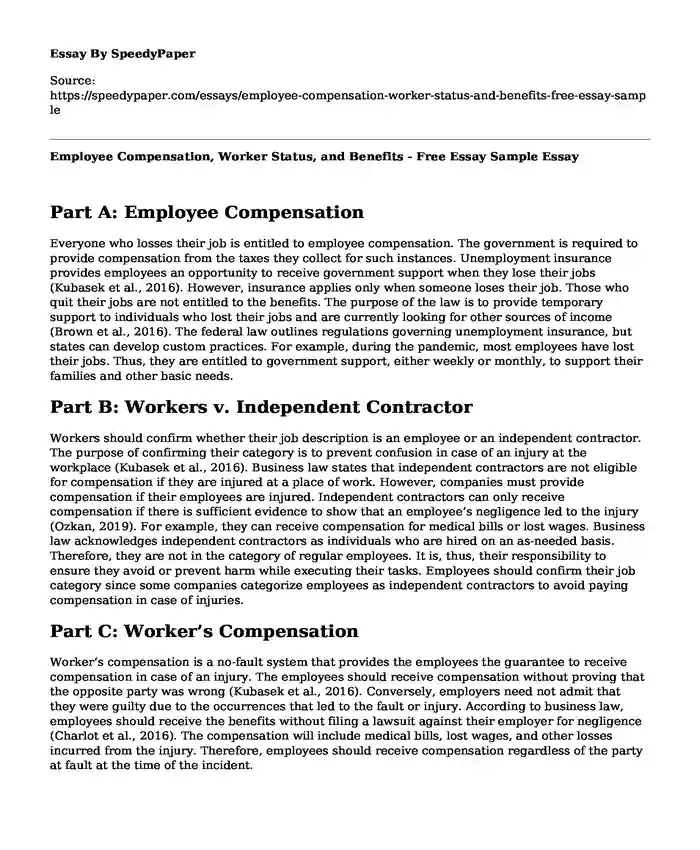
| Type of paper: | Essay |
| Categories: | Company Employment Government |
| Pages: | 3 |
| Wordcount: | 672 words |
Part A: Employee Compensation
Everyone who losses their job is entitled to employee compensation. The government is required to provide compensation from the taxes they collect for such instances. Unemployment insurance provides employees an opportunity to receive government support when they lose their jobs (Kubasek et al., 2016). However, insurance applies only when someone loses their job. Those who quit their jobs are not entitled to the benefits. The purpose of the law is to provide temporary support to individuals who lost their jobs and are currently looking for other sources of income (Brown et al., 2016). The federal law outlines regulations governing unemployment insurance, but states can develop custom practices. For example, during the pandemic, most employees have lost their jobs. Thus, they are entitled to government support, either weekly or monthly, to support their families and other basic needs.
Part B: Workers v. Independent Contractor
Workers should confirm whether their job description is an employee or an independent contractor. The purpose of confirming their category is to prevent confusion in case of an injury at the workplace (Kubasek et al., 2016). Business law states that independent contractors are not eligible for compensation if they are injured at a place of work. However, companies must provide compensation if their employees are injured. Independent contractors can only receive compensation if there is sufficient evidence to show that an employee’s negligence led to the injury (Ozkan, 2019). For example, they can receive compensation for medical bills or lost wages. Business law acknowledges independent contractors as individuals who are hired on an as-needed basis. Therefore, they are not in the category of regular employees. It is, thus, their responsibility to ensure they avoid or prevent harm while executing their tasks. Employees should confirm their job category since some companies categorize employees as independent contractors to avoid paying compensation in case of injuries.
Part C: Worker’s Compensation
Worker’s compensation is a no-fault system that provides the employees the guarantee to receive compensation in case of an injury. The employees should receive compensation without proving that the opposite party was wrong (Kubasek et al., 2016). Conversely, employers need not admit that they were guilty due to the occurrences that led to the fault or injury. According to business law, employees should receive the benefits without filing a lawsuit against their employer for negligence (Charlot et al., 2016). The compensation will include medical bills, lost wages, and other losses incurred from the injury. Therefore, employees should receive compensation regardless of the party at fault at the time of the incident.
Part D: Worker’s Compensation is Beneficial
Workers' compensation is always beneficial to workers since it provides financial assistance to pay medical bills and recover lost wages. However, some employees may believe that workers' compensation is not beneficial to workers (Kubasek et al., 2016). One of the major reasons is that some employers default in paying their workers. The compensation may delay, and, thus, employees fail to realize its value. Fraud is another issue that obstructs the benefits that employees receive. However, workers' compensation is essential since they can pay all the hospital bills necessary to resume work (Charlot et al., 2016). It also allows them to maintain their productivity before the incident. The government agencies' role is to ensure companies comply with the regulations that support workers’ welfare. Complying with the regulations is essential for employees since they will experience a friendly working environment. They will receive fair compensation for the efforts they have put to enhance economic growth.
References
Brown, J. L., Farrington, S., & Sprinkle, G. B. (2016). Biased self-assessments, feedback, and employees' compensation plan choices. Accounting, Organizations and Society, 54, 45-59. https://doi.org/10.1016/j.aos.2016.08.003
Charlot, O., Malherbet, F., & Ulus, M. (2016). Unemployment compensation and the allocation of labor in developing countries. Journal of Public Economic Theory, 18(3), 385-416. https://doi.org/10.1111/jpet.12144
Kubasek, N. K., Brennan, B. A., & Browne, M. N. (2016). The legal environment of business: A Critical Thinking Approach, (8th Eds). Pearson.
Ozkan, U. R. (2019). The origins of severance pay in unemployment compensation: a comparative analysis. Labor History, 60(4), 351-371. https://doi.org/10.1080/0023656X.2019.1537033
Cite this page
Employee Compensation, Worker Status, and Benefits - Free Essay Sample. (2023, Oct 18). Retrieved from https://speedypaper.com/essays/employee-compensation-worker-status-and-benefits-free-essay-sample
Request Removal
If you are the original author of this essay and no longer wish to have it published on the SpeedyPaper website, please click below to request its removal:
- Role of the Army, Essay Example for Free Download
- Essay Example on Development Federalism
- Walmart Analysis Essay Example
- Essay Sample Answering the Questions Concerning Federal System in the US
- Civil-Military Relations, Comparison Between Turkey and Egypt Before and After Arab Spring. Essay Example
- Importance of Diversity in the Workplace - Essay Example
- Macroeconomics in Healthcare - Paper Sample
Popular categories




